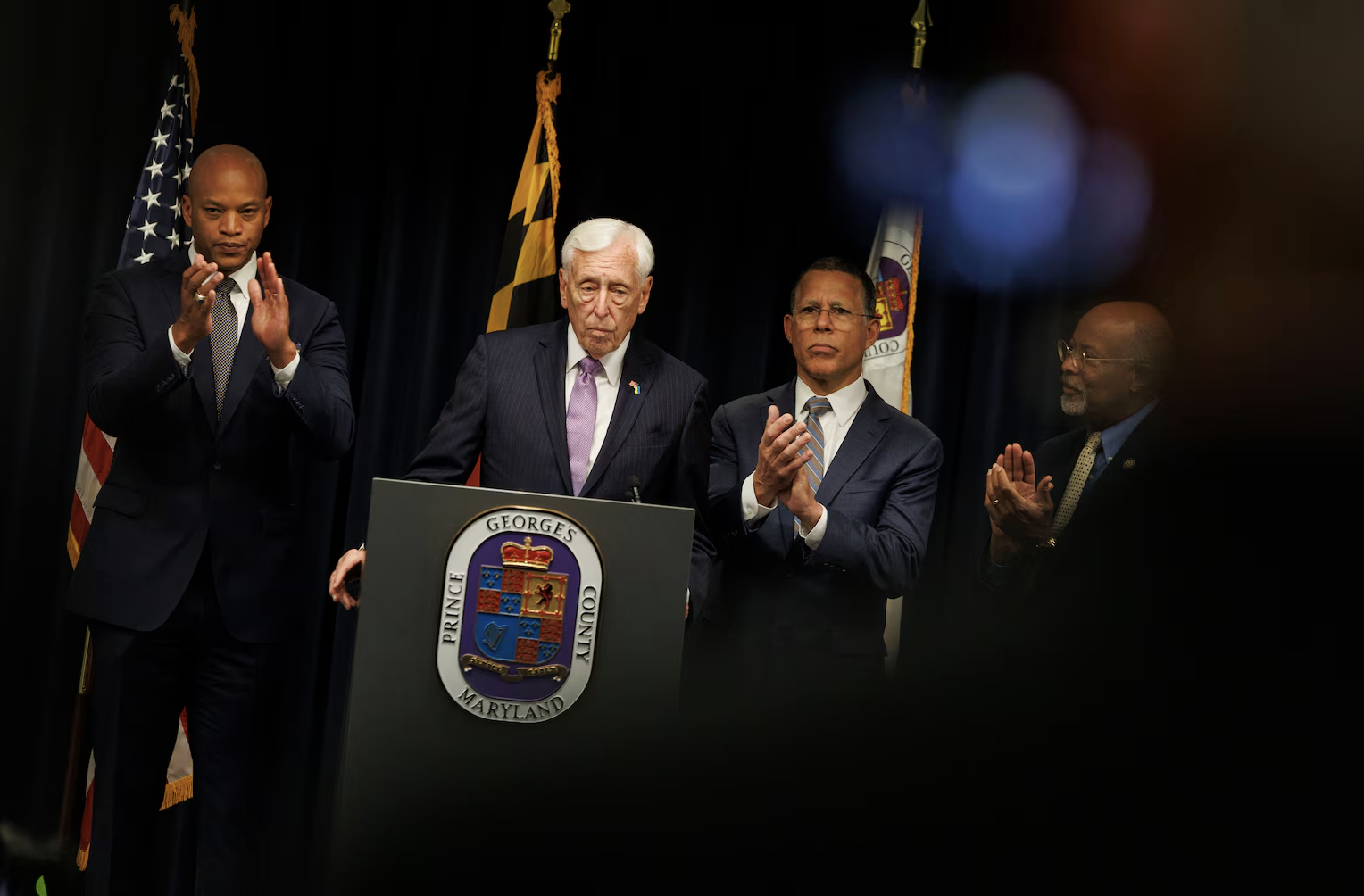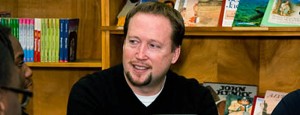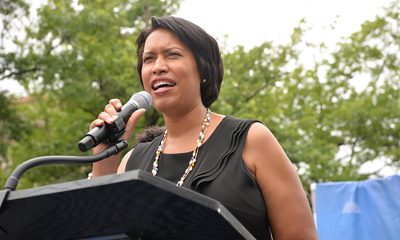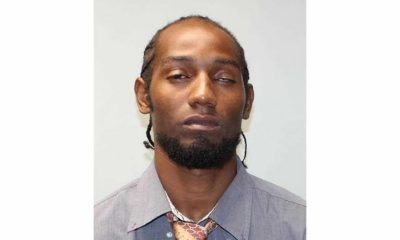Local
Slain D.C. middle school principal was gay
Brian Betts hailed as innovative educator, hero to students
Brian Betts, the highly acclaimed D.C. middle school principal who was found shot to death April 15 at his home in Silver Spring, Md., was out as a gay man to a circle of friends and D.C. public school system colleagues, multiple sources have told the D.C. Agenda.
Montgomery County police said they discovered Betts’ fully clothed body in a second floor bedroom in his house along the 9300 block of Columbia Boulevard in Silver Spring. Police noted there were no signs of a forced entry into the house, leading them to believe that Betts, 42, invited his killer or killers inside.
Police spokesperson Sgt. C. Thomas Jordan said he could not comment on whether Betts’ murder was related to the slain principal’s sexual orientation, saying only that homicide detectives were investigating all possible angles of the case to identify a suspect or suspects.
“I know our investigators are talking to everyone they know of to get to the bottom of the case,” he said. “We are going to investigate every avenue. Our role is to solve a homicide.”
Betts established a reputation as a rising star in the Montgomery County public school system as a teacher and assistant principal before D.C. Public Schools Chancellor Michelle Rhee recruited him to join her and Mayor Adrian Fenty’s efforts to overhaul the District’s long troubled school system.
In 2008, Rhee named Betts principal of Shaw Middle School at Garnet-Patterson, a recently reorganized school in the city’s historic Shaw neighborhood. School officials said he quickly emerged as one of the school system’s most innovative principals.
The Washington Post reported that students liked him so much that they asked and Rhee agreed to allow 100 students to remain at the middle school for their ninth grade instead of the normal process of advancing to another school for that grade.
“The unexpected death of Brian Betts is unspeakably tragic for his family, for the Shaw Middle School community, and for all of D.C. Public Schools,” Rhee said in a statement.
“Brian Betts had the courage to take on the leadership of a struggling, underperforming DCPS school,” she said. “He was an inspirational leader for the teachers and for the students, and that leadership was bringing results. He knew what the children under his care were capable of, and he was determined to show them how to get there.”
Montgomery County police disclosed that D.C. police found Betts’ blue Nissan Xterra SUV on April 16 along the 3900 block of Fourth Street, S.E., in D.C., where it was believed to have been abandoned by two suspects between noon and 3 p.m. Police sources said investigators learned from a nearby resident that two males were seen leaving the vehicle, but as of Tuesday police declined to release a description of them.
On Monday, a Montgomery police spokesperson issued another statement saying investigators established that Betts was alive at least until 11:30 p.m. April 14. News media have reported neighbors observing that Betts had hosted a barbeque cookout for one or more people in his back yard on the night of April 14. Police would neither confirm nor deny that report.
Police arrived at Betts’ house about 7:30 p.m. April 15 after a co-worker called to report he had failed to show up at work that morning and could not be reached. The co-worker arrived at the house to investigate his whereabouts and entered the house after discovering the front door was unlocked, police said. Rather than investigate further, the co-worker called police, and police discovered Betts’ body in an upper floor bedroom.
One gay man who knew Betts from the time Betts lived in D.C.’s Shaw neighborhood said Betts had a circle of gay friends and was seen patronizing the Dupont Circle gay bars Omega and Fireplace.
Another gay man who knew him said he assumed Betts was “out” as gay because many people in the gay community knew him in gay circles.
“He was definitely a member of the GLBT community,” said the man, who spoke to D.C. Agenda on condition that he was not identified.
Capt. Paul Starks, director of the Montgomery County police’s public affairs office, declined to comment on Betts’ sexual orientation or whether police were looking into whether the case was a possible hate crime or pick-up murder.
Gay activists and LGBT anti-violence groups in D.C. and other cities have expressed concern in the past that police investigators sometimes failed to seek help from the LGBT community in cases where mostly gay men were robbed or killed by men they met in gay clubs or meeting places and invited home.
In an investigative series of stories in the 1980s and 1990s, the Washington Blade reported more than 20 murders of gay men in the D.C. metropolitan area believed to be pick-up murders remained unsolved. Police confirmed that in each of the cases, investigators found no signs of a forced entry into the victims’ homes, where their bodies were found.
Following the murder of D.C. gay resident Anthony Perkins in December, when police found him shot to death inside his parked car in Southeast D.C., the D.C. police’s Gay & Lesbian Liaison Unit distributed flyers with Perkin’s photo to local gay clubs seeking information from members of the LGBT community.
The GLLU issued a similar flyer in February following the murder of a gay man from Maryland who also was shot inside his car on a Northeast Washington street.
D.C. police have arrested and charged suspects with first-degree murder while armed in both cases.
“Brian Betts was by all accounts an amazingly dedicated teacher and administrator,” said Peter Rosenstein, a D.C. gay activist. “Nothing can ever take that reputation from him. I never knew Brian, but friends did and according to them he was a brilliant, charming, funny, committed-to-his-family-and-students gay man.
“If this is true, my question to the police is: If his murder could be related to his being gay, are they using the GLBT community to help find his murderer?” Rosenstein said. “Are notices being sent out through the GLLU and other avenues to find this murderer and bring him [or] them to justice? Brian deserves no less from society than that we find who is responsible for this heinous crime.”
Sharon Stapel, executive director of the New York City Anti-Violence Project, which monitors violence against LGBT people, said her group defers to police, family members and relatives of LGBT crime victims on whether to disclose the sexual orientation of such victims.
But she added, “Certainly the stigma and fear about being outed is something that can be an obstacle to investigating cases where someone may identify as LGBT.”
“We want people to feel free to come forward if they think that they have information that would be helpful,” Stapel said. “But all of those decisions have to be made in the context of what’s going on in their lives and in the victims’ lives and in the lives of other folks who care for the victim.
“And the reality is we still live in a very violent and very dangerous homophobic world.”
Eliza Byard, executive director of the Gay, Lesbian & Straight Education Network, called Betts “a remarkable example of many, many, many men and women who are gay and lesbian who dedicate their lives to education.”
Pointing to Betts’ work to help transform D.C.’s public schools through his job as a middle school principal, Byard characterized him as “a real example of the amazing work that lesbians and gay men are doing as leaders in schools every single day, whether they are principals or teachers, and the contributions they are making to our schools.”
Virginia
Gay Va. State Sen. Ebbin resigns for role in Spanberger administration
Veteran lawmaker will step down in February

Alexandria Democrat Adam Ebbin, who has served as an openly gay member of the Virginia Legislature since 2004, announced on Jan. 7 that he is resigning from his seat in the State Senate to take a job in the administration of Gov.-Elect Abigail Spanberger.
Since 2012, Ebbin has been a member of the Virginia Senate for the 39th District representing parts of Alexandria, Arlington, and Fairfax counties. He served in the Virginia House of Delegates representing Alexandria from 2004 to 2012, becoming the state’s first out gay lawmaker.
His announcement says he submitted his resignation from his Senate position effective Feb. 18 to join the Spanberger administration as a senior adviser at the Virginia Cannabis Control Authority.
“I’m grateful to have the benefit of Senator Ebbin’s policy expertise continuing to serve the people of Virginia, and I look forward to working with him to prioritize public safety and public health,” Spanberger said in Ebbin’s announcement statement.
She was referring to the lead role Ebbin has played in the Virginia Legislature’s approval in 2020 of legislation decriminalizing marijuana and the subsequent approval in 2021of a bill legalizing recreational use and possession of marijuana for adults 21 years of age and older. But the Virginia Legislature has yet to pass legislation facilitating the retail sale of marijuana for recreational use and limits sales to purchases at licensed medical marijuana dispensaries.
“I share Governor-elect Spanberger’s goal that adults 21 and over who choose to use cannabis, and those who use it for medical treatment, have access to a well-tested, accurately labeled product, free from contamination,” Ebbin said in his statement. “2026 is the year we will move cannabis sales off the street corner and behind the age-verified counter,” he said.
Maryland
Steny Hoyer, the longest-serving House Democrat, to retire from Congress
Md. congressman served for years in party leadership

By ASSOCIATED PRESS and LISA MASCARO | Rep. Steny Hoyer of Maryland, the longest-serving Democrat in Congress and once a rival to become House speaker, will announce Thursday he is set to retire at the end of his term.
Hoyer, who served for years in party leadership and helped steer Democrats through some of their most significant legislative victories, is set to deliver a House floor speech about his decision, according to a person familiar with the situation and granted anonymity to discuss it.
“Tune in,” Hoyer said on social media. He confirmed his retirement plans in an interview with the Washington Post.
The rest of this article can be found on the Baltimore Banner’s website.
District of Columbia
Kennedy Center renaming triggers backlash
Artists who cancel shows threatened; calls for funding boycott grow

Efforts to rename the Kennedy Center to add President Trump’s name to the D.C. arts institution continue to spark backlash.
A new petition from Qommittee , a national network of drag artists and allies led by survivors of hate crimes, calls on Kennedy Center donors to suspend funding to the center until “artistic independence is restored, and to redirect support to banned or censored artists.”
“While Trump won’t back down, the donors who contribute nearly $100 million annually to the Kennedy Center can afford to take a stand,” the petition reads. “Money talks. When donors fund censorship, they don’t just harm one institution – they tell marginalized communities their stories don’t deserve to be told.”
The petition can be found here.
Meanwhile, a decision by several prominent musicians and jazz performers to cancel their shows at the recently renamed Trump-Kennedy Center in D.C. planned for Christmas Eve and New Year’s Eve has drawn the ire of the Center’s president, Richard Grenell.
Grenell, a gay supporter of President Donald Trump who served as U.S. ambassador to Germany during Trump’s first term as president, was named Kennedy Center president last year by its board of directors that had been appointed by Trump.
Last month the board voted to change the official name of the center from the John F. Kennedy Memorial Center For The Performing Arts to the Donald J. Trump And The John F. Kennedy Memorial Center For The Performing Arts. The revised name has been installed on the outside wall of the center’s building but is not official because any name change would require congressional action.
According to a report by the New York Times, Grenell informed jazz musician Chuck Redd, who cancelled a 2025 Christmas Eve concert that he has hosted at the Kennedy Center for nearly 20 years in response to the name change, that Grenell planned to arrange for the center to file a lawsuit against him for the cancellation.
“Your decision to withdraw at the last moment — explicitly in response to the Center’s recent renaming, which honors President Trump’s extraordinary efforts to save this national treasure — is classic intolerance and very costly to a non-profit arts institution,” the Times quoted Grenell as saying in a letter to Redd.
“This is your official notice that we will seek $1 million in damages from you for this political stunt,” the Times quoted Grenell’s letter as saying.
A spokesperson for the Trump-Kennedy Center did not immediately respond to an inquiry from the Washington Blade asking if the center still planned to file that lawsuit and whether it planned to file suits against some of the other musicians who recently cancelled their performances following the name change.
In a follow-up story published on Dec. 29, the New York Times reported that a prominent jazz ensemble and a New York dance company had canceled performances scheduled to take place on New Year’s Eve at the Kennedy Center.
The Times reported the jazz ensemble called The Cookers did not give a reason for the cancellation in a statement it released, but its drummer, Billy Hart, told the Times the center’s name change “evidently” played a role in the decision to cancel the performance.
Grenell released a statement on Dec. 29 calling these and other performers who cancelled their shows “far left political activists” who he said had been booked by the Kennedy Center’s previous leadership.
“Boycotting the arts to show you support the arts is a form of derangement syndrome,” the Times quoted him as saying in his statement.
-

 Colombia5 days ago
Colombia5 days agoGay Venezuelan man who fled to Colombia uncertain about homeland’s future
-

 Arts & Entertainment5 days ago
Arts & Entertainment5 days ago2026 Most Eligible LGBTQ Singles nominations
-

 District of Columbia4 days ago
District of Columbia4 days agoKennedy Center renaming triggers backlash
-

 District of Columbia4 days ago
District of Columbia4 days agoNew interim D.C. police chief played lead role in security for WorldPride





















